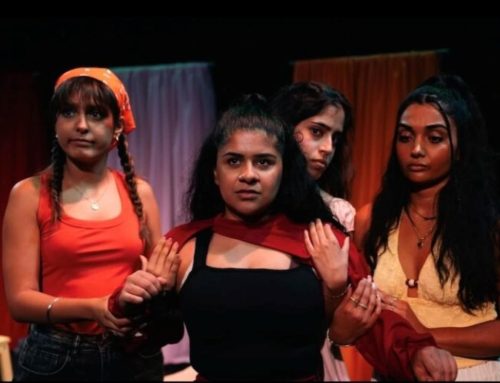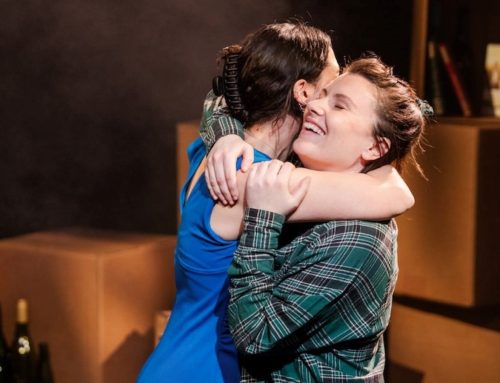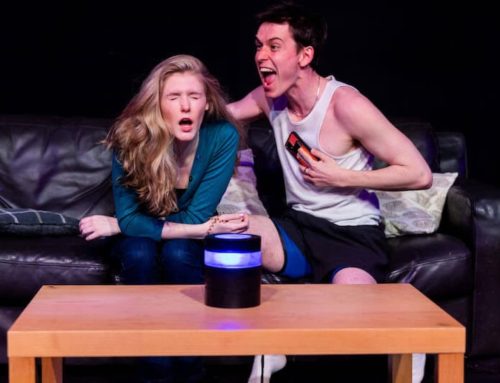Jen Tucker’s underworked The Defamation sees dying women despatched to a female-only afterlife, there to face trial by a jury of sinister male “Dukes”. A not-guilty verdict sees one ascend into paradise. A judgement of guilty brings the eternal damnation of hell. “The Dukes decide while in this grim purgatory we reside” is a pithy summary. Only most often the Dukes do not decide, they just find reasons to delay their verdicts. As a result, there is an immense backlog of cases to clear. Indeed Eve, an unseen presence offstage, has been waiting for her day of reckoning since those unfortunate shenanigans in the Garden of Eden. “Bear with us here” seems to be the Dukes’ primary holding message.
This explains why five of Shakespeare’s female characters end up shooting the breeze in a kind of spiritual library. They are not exactly happy in purgatory but make the most of things reading their own plays, playing chess, singing folk songs, and erupting into spontaneous dance – think a well-heeled Home Counties care home kind of vibe. The materfamilias and sometime narrator is Lady MacBeth (Giulia Duggan has the best of the evening), who insists no one should sit on her chair in her absence. Into the mix arrives Charity (Zoe Kirk) loosely based on Amber Heard, whose defamation battles against Johnny Depp fertilised oodles of tabloid outrage some years back. A token man, Gilmore (Aaron Thakar mines some much needed humour), appears as cleaner, warden, and comic relief.
Tucker’s theme seems to be that men have undone all these women: “women fall when there is no strength in men” one says. Only it is a tough ask to find a convincing commonality between the characters. One could argue that Othello’s Desdemona (Jen Tucker performs as well as writes and directs), Hamlet’s Ophelia (Zora Owen), Much Ado About Nothing’s Hero (Lily Nova) and The Winter’s Tale’s Hermione (Lizzie O’Reilly), possess a shared hamartia: naivety, passivity, submissiveness, and an all-round absence of nous. One could also argue these flaws comfortably exist in the absence of men. While Lady MacBeth certainly suffers, she is a country mile from the floral virtue of Ophelia. Amber Heard, a controversial figure to some, could never be accused of passivity. What connects them?
It is not entirely clear what these women are on trial for. Perhaps just for being female. Neither is it clear why Charity gets to skip the trial queue and have an immediate hearing (perhaps the Dukes are partial to some Hollywood glitz). Charity’s witness box argument seems to be that most women lie on the middle ground between innocent flower and total fiend. We are human and deserve to be treated with humanity is her cry. Fair enough, but surely the same could be said of men.
Tucker’s dialogue, a blend of blank and rhymed verse, sometimes shines. More often it gets bogged down in over-elaborate faux Shakespearean syntax and prose; anticipate an awful lot of “oft”, “take my leave”, “fie”, and “I know not”.
Duggan’s MacBeth aside, what is missing from the characters is much burning anger or injustice. These women seem to have more or less accepted their lot in the afterlife. Ophelia’s main act of rebellion comes in handing out flowers to the audience. One wishes for a bit more feminist zest. This feels like work in progress.
Writer and Director: Jen Tucker
More Recent Reviews
The Sea Horse. Golden Goose Theatre.
The Sea Horse, Edward J Moore’s grim slice of mid-century realism, debuted to solid reviews off-Broadway in 1974. Since [...]
Garry Starr: Classic Penguins. Arts Theatre.
Emperor penguins’ shortish treks between sea and nesting sites are about as peripatetic as your average Thameslink commuter. Garry [...]
When the Clarion Came to Call. Cockpit Theatre.
When, upon entering an auditorium, you are told, ‘Take as many pictures as you like, but mind the ceramics,’ [...]






